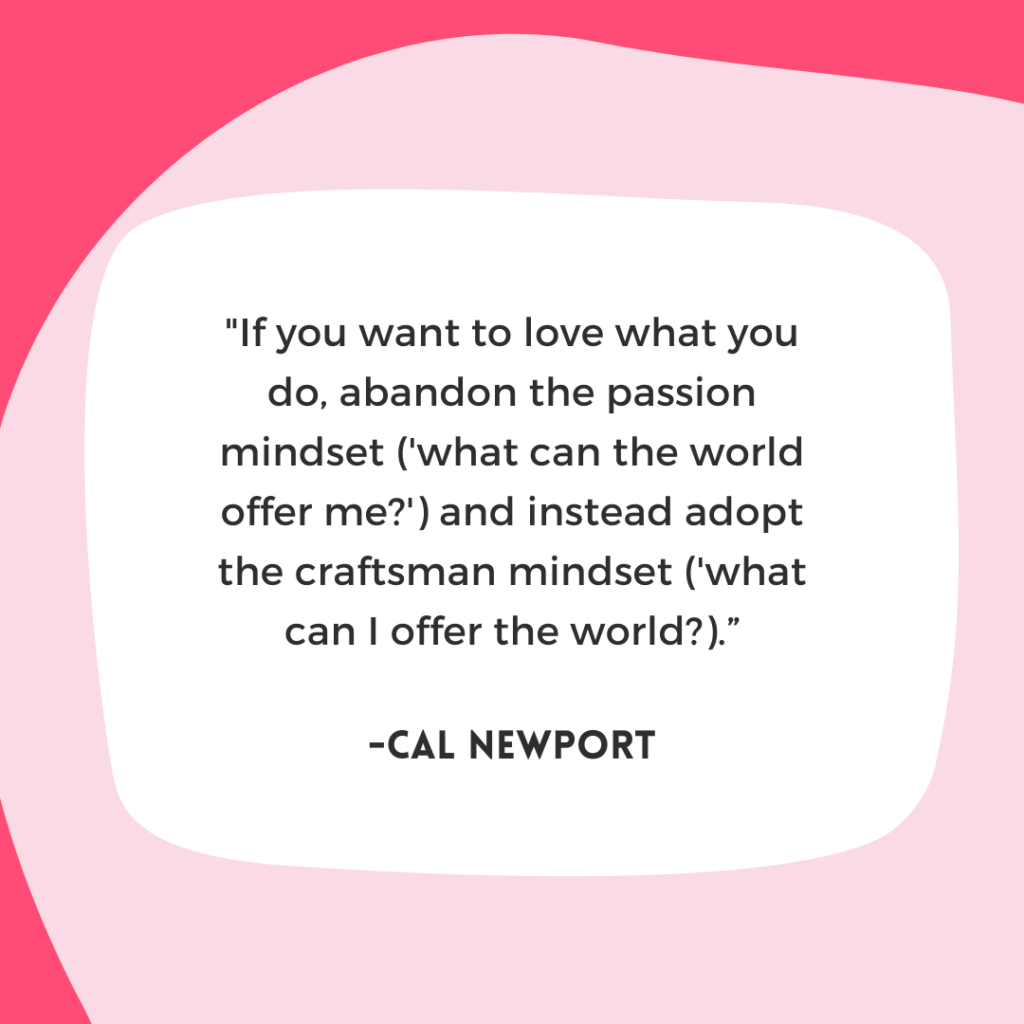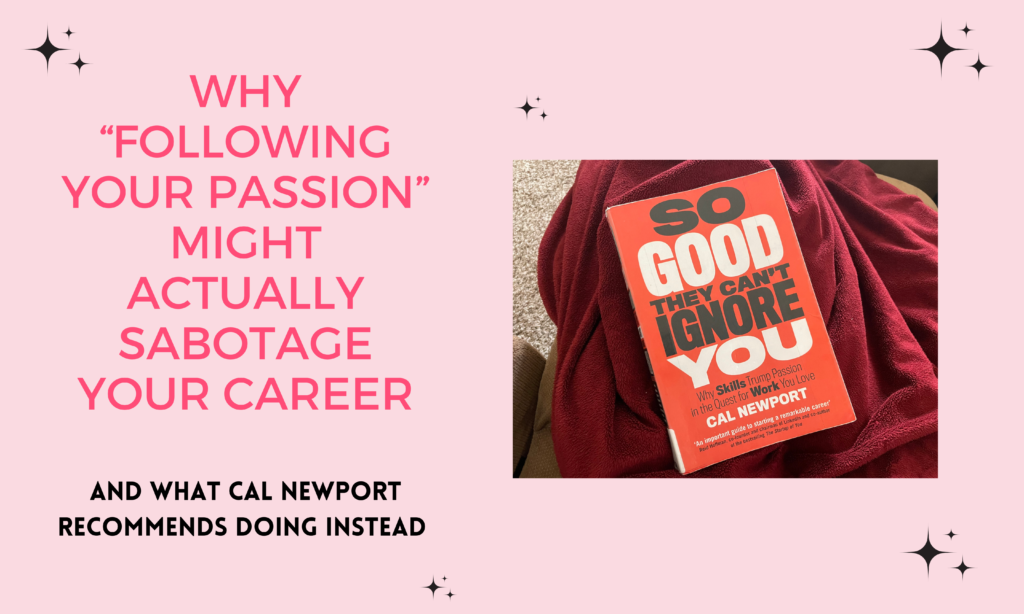Cal Newport wears many hats: academic, published author, and perhaps most notably, social media abstinent. In fact, the first time I heard this, I was in complete shock. A millennial without social media? But it’s true. Despite being a part of Gen Y and having established tremendous success in a media-heavy career, Newport has never had a social media presence.
Between his highly-touted Digital Minimalism and immensely refreshing Deep Work, the Georgetown professor knows a thing or two about cutting through the noise and focusing on what matters.
After devouring these two books, I turned to a third highly-regarded title by Newport: So Good They Can’t Ignore You. I’ll admit, I was hesitant about reading the book at first, despite rave reviews. I’ve been working on my tendency to over-identify with work and what I do. Given that this book is all about career building, I thought I might get pulled into this mindset again.
Thankfully, though, the book had the opposite effect. So Good They Can’t Ignore You instead focuses on creating work that is purpose-driven, autonomous, and grounded in what Newport calls “career capital.” It’s not another hustle culture Bible, nor is it a get-rich-quick scheme.
As with most books, there were areas with which I didn’t fully align, but several others proved deeply resonant. I’ll share my biggest, most impactful takeaways. But first, let me give an overview of the book’s premise.
Synopsis
“Follow your dreams! Pursue your passions!” How many of us hear these statements when trying to hone in on a career path? While it’s common advice, Cal Newport challenges this conventional wisdom. In So Good They Can’t Ignore You, he quashes the notion of following your passion when it comes to choosing a career by interviewing people whose life stories suggest otherwise. Newport argues that passion is not enough to guarantee success and fulfillment in your career. Instead, he suggests that acquiring rare and valuable skills, which he refers to as “career capital,” is the key to achieving both career satisfaction and success.
Newport starts out by debunking the “passion hypothesis” and argues that following your passion is a flawed approach to career planning. He instead advocates for a “craftsman mindset,” which allows us to pick up skills and intentionally work on improving them. Newport then introduces the concept of “career capital” and explains why it’s essential for building a successful and meaningful professional life. Finally, Newport mentions the significance of having mission-driven work, as this not only sustains us through the challenging moments but also reminds us that our work is making a difference in the world.
Throughout the book, Newport provides numerous examples of people — from Steve Jobs to a screenwriter to an East Coast farmer — who have successfully applied the principles of career capital to achieve remarkable rewards in their careers.
At its heart, So Good They Can’t Ignore You challenges the conventional wisdom about work and offers a fresh perspective on what it takes to build an empowering career.
Takeaway #1: Build career capital
So, we all know the importance of financial capital — whether it’s to start a business, buy a home, or even start a family. In So Good They Can’t Ignore You, Newport applies this idea to our careers.
He emphasizes the integral role career capital plays in career mobility and also highlights its significance when trying to embark upon an entrepreneurial endeavor. Many people quit their jobs or start out in their careers to “follow their passions.” And while passion is, indeed, central to living a life of meaning and forward momentum, it’s not always conducive to success.
Newport argues that most of us have it backward — we follow our passions before we build skills. He instead makes the claim that building foundational skills and cultivating experience is what ultimately leads us to our passions. When we develop these skills, we’re more adept at taking on more complex roles or venturing out into our own endeavors with success. This gives us the confidence and solid foundation to enter career paths that will allow us to thrive in the long run.

Takeaway #2: Meaning evolves over time
Moment of honesty: I sometimes feel ashamed that I don’t have a “normal” career trajectory. I’ve bounced around between career paths and spent the first year after university volunteering and traveling abroad. Coming from a South Asian background, where many follow a linear, well-trodden path, I always felt guilty for going my own way.
But Newport argues that passion, and thus, meaning unravel over time. Few of us know what we want to do at 18, or even after wrapping up a university education. By allowing ourselves to fumble for a little while, we get that much closer to what we find meaningful. And it’s this meaning, Newport suggests, that allows us to stick it out in a career path over time, through all of the setbacks and struggles.
Takeaway #3: Control is everything
Many of us feel frustrated with our full-time jobs (and even end up quitting them) because of one thing: control. Or, more appropriately, a lack thereof. When we have control in our careers — whether it’s the flexibility to work from home, set our hours, or have a say in day-to-day operations (or all of the above), we’re more emotionally invested.
Newport shared numerous examples of individuals — from a successful freelance software developer to Derek Sivers — who have cultivated control in their professional lives. As a result of this control, they not only work in ways that support their values and long-term visions, but they also have more time outside of their careers to do what they love. Their jobs don’t consume their entire lives, and they aren’t held back by rigid standards or expectations.
To get to this point, though, these people first had to build up their career capital. By cultivating rare and in-demand skills, these individuals opened up the doors for greater control in their work lives, and ultimately, their lives as a whole.
Final Thoughts
As the global definition of “work” undergoes seismic shifts, it’s essential that we reframe our outlooks on our careers. No longer is a job or career path a means to an end. When done right, as Newport suggests, it allows us to make an impact and continually challenge ourselves. And ideally, it should give us the freedom to pursue other interests and endeavors.
This book helped me on my journey to finding more balance between my personal and professional lives, and solidified the importance of continuous learning. There’s no “right” way to find a career, nor are we limited to one path. Rather, our careers ebb and flow just as we do, shifting as we ourselves learn and grow.
Newport’s clear arguments and numerous case studies build a compelling case for building career capital. If you’ve been feeling stuck in your career path and need a bit of guidance, I highly recommend reading So Good They Can’t Ignore You. Hopefully, it can give you the insights you need to take the next step forward.

